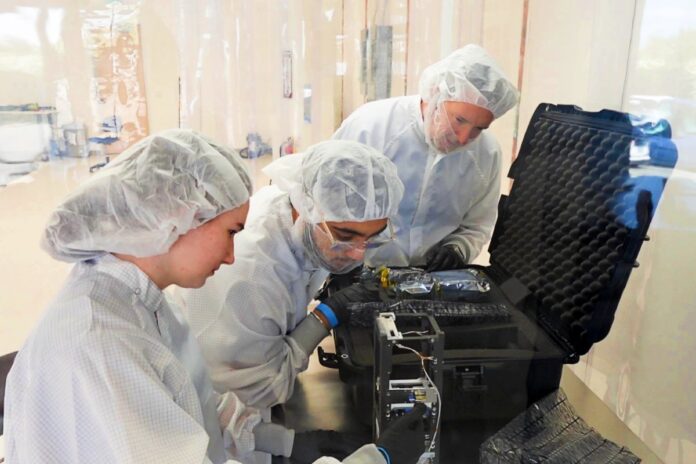Apolink, a Y Combinator-backed space-tech startup based by a 19-year-old Indian-origin entrepreneur, has raised $4.3 million in an “oversubscribed” seed spherical at a $45 million post-money valuation to construct a real-time connectivity community for satellites in low Earth orbit (LEO).
The startup is tackling a persistent downside in house communications. Satellites often go offline throughout components of their orbit as a consequence of lifeless zones — intervals when they aren’t within the line of sight of a floor station. Whereas relay satellites and international floor station networks assist cut back this downtime, they solely present partial options.
That hole has develop into essential because the house trade evolves. For years, NASA relied on its Tracking and Data Relay Satellite (TDRS) system to take care of near-continuous contact with satellites in geostationary orbit. However in 2022, the company introduced it will gradually phase out TDRS and transition to business suppliers for satellite tv for pc communications. Most of those business programs nonetheless deal with geostationary or medium Earth orbits. Apolink, previously often called Bifrost Orbital, goals to vary that by offering 24/7 connectivity to LEO satellites — with every orbital ring designed to deal with 256 customers at 9.6kbps.
“LEO has its own advantages,” stated Apolink founder Onkar Singh Batra in an unique interview. “It’s much closer than geostationary orbit, which means closing the link between the customer satellite and our constellation is way easier… that’s where you make the power requirements limited, and that’s where the compatibility comes in as well.”
Apolink’s strategy stems from Batra’s early recognition of this connectivity problem. On the age of 14 in 2020, he developed an curiosity in house. In 2022, when he was in twelfth grade at a protection college within the northern Indian metropolis of Jammu, he created a satellite system named InQube, which emerged as India’s first open-source satellite tv for pc. He additionally taught house ecosystems to engineering college students as a visitor professor at IIT Jammu between 2022–23.

Whereas engaged on his first satellite tv for pc system, Batra acknowledged the satellite tv for pc connectivity downside and observed that present options didn’t present backward compatibility, requiring particular {hardware} to allow community entry in orbit.
In accordance with Batra, the problem stay as a result of all different inter-satellite hyperlinks (ISLs) lack interoperability and will not be compliant with the Area Improvement Company’s necessities.
“We solve this [through] our hybrid-RF optical architecture and no user terminal, hardware-independent approach,” he acknowledged.
Some startups have tried to handle darkish zones by constructing new floor stations. Nevertheless, Batra famous that floor stations are “very cumbersome to work with and can’t guarantee a 24/7 link.”
“The maximum you can afford is a reliable continuous link to the ground during the window,” he stated.
Based in 2024, the Palo Alto-based startup plans to resolve the issue with a constellation of 32 satellites that embody lasers and radios to allow connectivity even for satellites that lack particular {hardware}.
Apolink, which accurately means Apogee-plus-link, goals to supply virtually 99% uptime and 10–15 seconds of latency. The latency can be additional decreased to 2–3 seconds as soon as the community is established.
Corporations, together with Amazon’s Kuiper and SpaceX’s Starlink, are additionally constructing inter-satellite hyperlinks to handle connectivity points for satellite tv for pc prospects. Nevertheless, Batra stated that the majority gamers with multipurpose constellations don’t dedicate them to digital relays, leading to restricted bandwidth obtainable for patrons. Additionally they require prospects to have an optical terminal put in on their web site for connectivity.
“Other ISL players focus on Ku/Ka-band and use optical terminals for EO image downlink, and we don’t,” he informed TechCrunch.
The startup has its personal FCC license, eliminating the necessity for patrons to satisfy further licensing necessities. Moreover, it produces satellite tv for pc parts, together with lasers and radios, in-house to make sure they’re suitable with its algorithms.
In Q2 2026, Apolink goals to launch its preliminary demo mission through a SpaceX rideshare. The mission will characteristic a 3U know-how demonstration satellite tv for pc, LinkONE/IPoS, designed to substantiate the backward-compatible radio-frequency relay in low Earth orbit, Batra stated.
A second demo is predicted in June 2027, that includes two satellites. In 2028, the startup will roll out its business constellation, with the whole constellation of 32 satellites anticipated to be launched in 2029.
Regardless of being within the early phases, the startup has already secured greater than $140 million in letters of intent from firms within the Earth remark, communication, and spatial knowledge sectors, together with Astro Digital, Hubble Community, and StarCatcher Industries.
Its new seed spherical was backed by Y Combinator, 468 Capital, Unshackled Ventures, Insurgent Fund, Maiora Ventures, and a number of other angel buyers, together with Laura Crabtree (CEO of Epsilon3), Benjamin Bryant (co-founder of Pebble Tech), and Kanav Kariya (president of Soar Crypto).
Apolink operates with has a core workforce of 4, every with greater than 5 years of trade expertise and from firms together with Maxar, Audacy, and Astra, situated inside a 4,000-square-foot R&D facility. The corporate presently focuses on spacecraft integration and testing and is working with early companions to validate its system in orbit.
#YCbacked #Apolink #19yearold #baggage #4.3M #construct #connectivity #LEO #satellites


